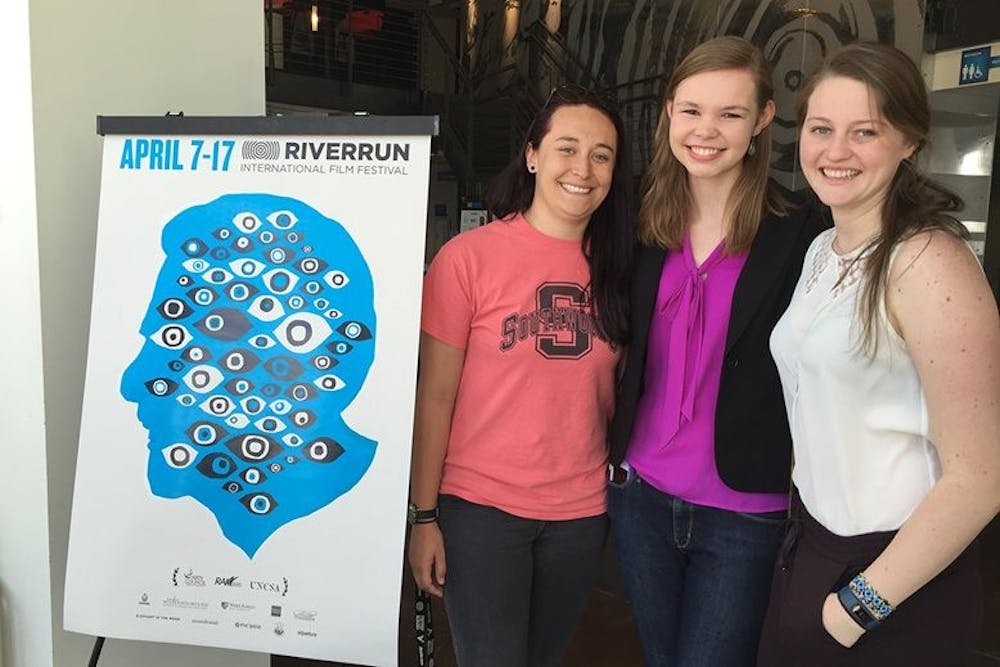What began as a class project has become a full-fledged documentary.
The film “Rebuilding” was created by sophomore Lauren Duncan and seniors Jacky Shacknow and Amory Parks as part of their “Producing the Documentary” course taught by Assistant Professor of Communications Nicole Triche. The film went on to win second place at RiverRun International Film Festival’s Pitch Fest in Winston-Salem.
“Rebuilding” explores the challenges of formerly incarcerated women by telling the story of one woman named Shannon.
“Our story has shifted over the semester, because initially we were going to do two different women at very different levels of transition back — we were going to interview one woman who has a master’s degree and is a social worker now and one who had just gotten out of prison,” Shacknow said. “Then kind of between a series of unfortunate events and finding Shannon whose story is so powerful, we didn’t really need anyone else.”
At Pitch Fest, which took place April 15, Parks pitched the film to a panel of judges, as well as an audience of classmates, professionals and community members. The presentation consisted of about a three-minute pitch by Parks as well as the film’s trailer, put together by Duncan.
The trailer includes a powerful look into Shannon’s story, including the confession, “I didn’t realize my purpose until I went to prison.”
In addition to PitchFest, students attended a panel on crowd-funding as well as a presentation of short films by fellow North Carolina filmmakers, including two Elon alumni.
All three students have been a part of Elondocs, also advised by Triche, which they all said was a big help in preparing them for creating a film of this scale, as well as bringing their ideas to PitchFest.
The group knew from the beginning of the semester that they wanted to do a film based around women. Initially they were debating between a film about the professional women’s football team in Durham or “Rebuilding.” It came down to who responded first because the group was equally interested in both topics.
“The football idea fell through, so we were just like, ‘Lets jump feet-first into this one,’” Shacknow said.
They got in contact with Shannon through a connection Parks had made with Benevolence Farm, a nonprofit in Graham that is a transitional working and living place for women who were previously incarcerated. Parks has made a documentary on Benevolence Farm as well.
“[I] wanted to dive deeper into the subject,” Parks said.
Though the three women don’t have defined roles in the making of the film, they have all been able to collaborate and utilize their individual skills.
“[The film is] very interview-heavy,” Duncan said. “It’s trying to go through Shannon’s past, present and future, so in order to really capture the past and capture a present and future that are not very visual it is very interview-based.”
The filmmakers reached a roadblock when Shannon’s employers wouldn’t allow them to mention her workplace. Duncan said this frustration allowed them to narrow in on a larger issue.
“Maybe what we are really getting at is that even though you do have a job and a place to live, not everything is resolved,” she said.
A final cut of the film has already been turned in, and moving forward the group will dive into not only what to do next, but how to do so as the class moves into the marketing stage of producing a film.
They hope to have the opportunity to show “Rebuilding” at various festivals, which Duncan will apply for a grant to do next year to cover submissions costs after Parks and Shacknow graduate in May to ensure a future for the film.
“We want to share it with organizations who can share it with different groups they are reaching out to,” Parks said. “Because we think it has the power to reach people who are working with people who are formally incarcerated, or are living by them and maybe still have the stigmas. But this could help break that down.”
As part of their prize for winning second place, the group also won $250 to help pay for production costs as well as submission fees.
With the news of “Rebuilding” winning second place, Shannon admitted that she hadn’t realized the impact Parks, Shacknow and Duncan wanted to make.
“Our general goal is to have this story be told,” Parks said. Part of what we conveyed in our pitch is that it’s not specifically an advocacy film, but we believe it has the power to advocate for women like Shannon, who have been incarcerated and have really changed their lives and do deserve a second chance but often aren’t given that,”


